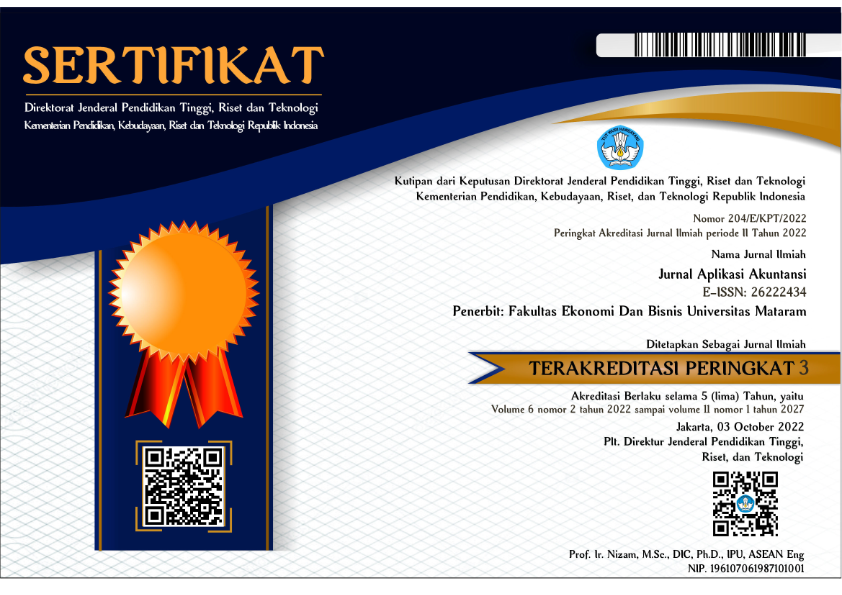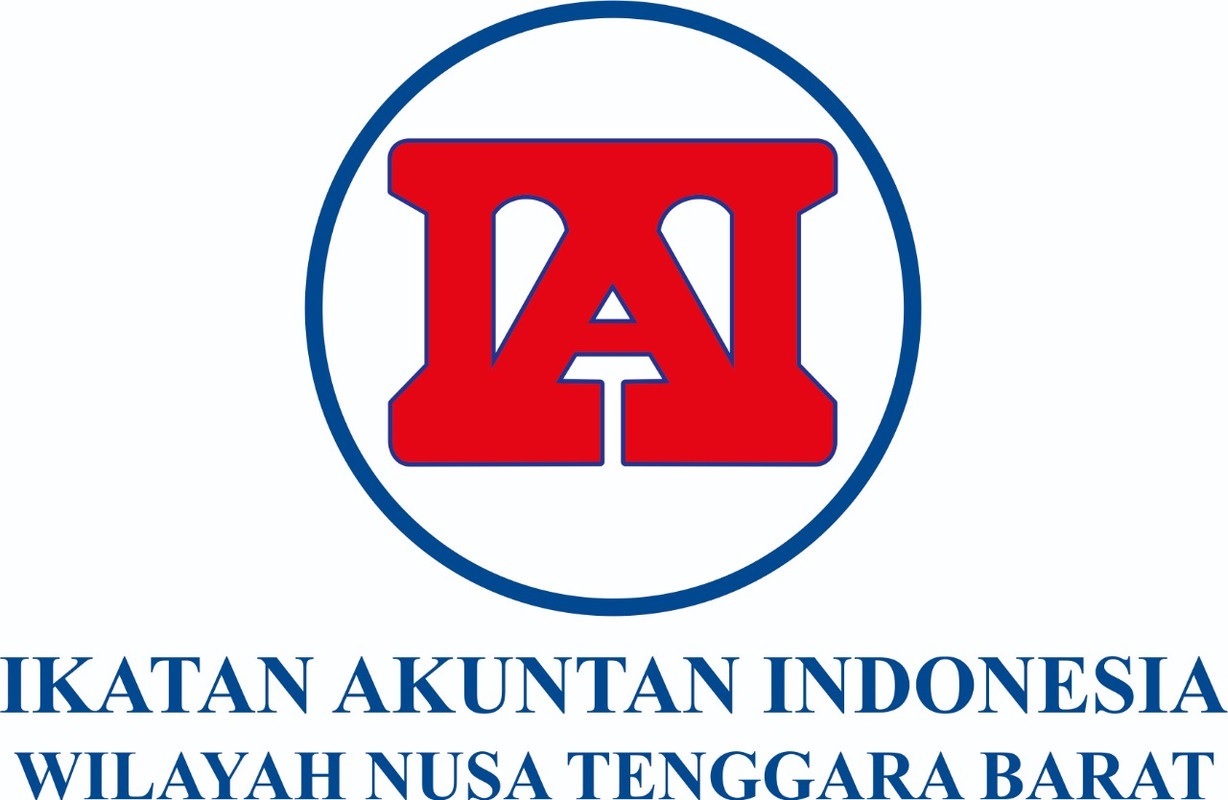PENGUNGKAPAN EMISI KARBON DAN GREEN ACCOUNTING TERHADAP PERFORMA PERUSAHAAN DENGAN PENGUNGKAPAN SDGs SEBAGAI VARIABEL PEMEDIASI
DOI:
https://doi.org/10.29303/jaa.v9i2.544Keywords:
Carbon Disclosure, Green accounting, Company Performance, SDGsAbstract
The disclosure of carbon emissions and the application of Green Accounting in corporate sustainability reports is voluntary. This means that companies have the freedom to disclose the extent of their role in environmental sustainability. This study aims to determine the effect of carbon emission disclosure and Green Accounting on company performance with the SDGS variable as a mediator. The sampling technique uses purposive sampling, which consists of 21 companies. The results of the data analysis concluded that the companies with the highest carbon emissions are companies in the infrastructure sector, the companies that incur the highest environmental costs are companies in the energy sector, carbon emissions disclosure has no effect on company performance, carbon emissions disclosure has no effect on SDGs disclosure, Green Accounting is having a significant impact on company performance, Green Accounting has a significant effect on SDGs disclosure, SDGs have a significant effect on company performance, SDGs are unable to mediate the impact of Green Accounting on company performance, and SDGs are unable to mediate the effect of carbon disclosure on company performance. The results of this study prove that the highest carbon-producing company does not automatically become the most responsible company for environmental management. This study has important implications for companies, the government, and investors in Indonesia. Companies are advised to implement Green Accounting and SDG disclosure as part of a long-term sustainability strategy to improve their financial performance and corporate image. To encourage businesses to be more environmentally friendly, the government needs to make rules and rewards stricter when it comes to lowering carbon emissions. We advise investors to weigh SDG disclosure alongside short-term financial performance when assessing a company's long-term performance.
References
Abdullah, M. W., Suwandi, M., Bayan, A. Y. M., & Hanafie, H. (2021). Green Accounting Based Maslahah to Realizing University Social Responsibility in Indonesia. International Conference on Economics, Business, Social, and Humanities (ICEBSH 2021), 943–950. https://www.atlantis-press.com/proceedings/icebsh-21/125959468
Agusdinata, D. B., Liu, W., Sulistyo, S., LeBillon, P., & Wegner, J. (2023). Evaluating sustainability impacts of critical mineral extractions: Integration of life cycle sustainability assessment and SDGs frameworks. Journal of Industrial Ecology, 27(3), 746–759. https://doi.org/https://doi.org/10.1111/jiec.13317
Alaika, A. A., & Firmansyah, A. (2024). Unveiling The Impact of Green Accounting and Sustainability Disclosure On The Firm Value. 4(2). https://doi.org/10.31098/jgrcs.v4i2.2436
Bagraff, H., & Ahsan, M. (2024). Green Accounting, Financial Performance, and Company Value: A Bibliometric Study. International Journal of Current Science Research and Review, 07. https://doi.org/10.47191/ijcsrr/V7-i6-63
Banani, A., & Sunarko, B. (2022). Nexus between Green Finance, Creativity, Energy Accounting and Financial Performance: Banks Sustainability Analysis from Developing Country. International Journal of Energy Economics and Policy, 12(6), 447–455. https://doi.org/10.32479/ijeep.13806
Borghei, Z. (2021). Carbon disclosure: A systematic literature review. Accounting & Finance, 61(4), 5255–5280.
Bujor, D., Frățiloiu, B. A., Zavatin, I., & Jansen, A. (2023). Corporate Carbon Performance Study Across Nations: The Point of View of Global Investors. 151–158. https://doi.org/10.24818/basiq/2023/09/030
Centre, K. D. I. (2022). Indonesia Carbon Trading. Kata Data Insight Center, Agustus, 1–77.
Choiriah, S., & Lysandra, S. (2023). Effect of Green Accounting, Quality Management on Financial Performance, and Green Innovation as Moderation Variables. Journal of Economics, Finance and Management Studies, 06(07), 3534–3542. https://doi.org/10.47191/jefms/v6-i7-61
Dian Rahmawati Putri, & Murtanto. (2023). Pengaruh Carbon Emission Disclosure, Carbon Performance, Dan Green Intellecetual Capital Terhadap Kinerja Perusahaan. Jurnal Ekonomi Trisakti, 3(1), 1069–1080. https://doi.org/10.25105/jet.v3i1.16025
Freeman, R. E. (2020). The stakeholder approach revisited. Wirtschafts-Und Unternehmensethik, 657–671.
Ibnu Al Hasyim, Afief Azmi, & Muhammad Zulfikar. (2024). Reviewing Indonesia's Commitment In The Paris Agreement 2015 Era Of President Joko Widodo (New And Renewable Energy). Jurnal Ilmu Sosial Politik Dan Humaniora, 7(2 SE-Articles), 23–33. https://doi.org/10.36624/jisora.v7i2.152
Justita Dura, & Riyanto Suharsono. (2022). Application Green Accounting To Sustainable Development Improve Financial Performance Study In Green Industry. Jurnal Akuntansi, 26(2), 192–212. https://doi.org/10.24912/ja.v26i2.893
Khan, S., & Gupta, S. (2024). The interplay of sustainability, corporate Green Accounting and firm financial performance: a meta-analytical investigation. Sustainability Accounting, Management and Policy Journal, 15(5), 1038–1066. https://doi.org/https://doi.org/10.1108/SAMPJ-01-2022-0016
Kristari, D. M., & Teruna, A. Y. (2022). The Effect of Carbon Emission Disclosure and Corporate Social Responsibility On The Financial Performance of Manufacturing Companies In Indonesia. Asian Journal of Social and Humanities, 1(03), 132–139. https://doi.org/10.59888/ajosh.v1i03.17
Lin, P., Li, P., & Akbar, A. (2023). Examining the influence of institutional investors on the readability of environmental disclosure in CSR reports of Chinese listed firms. Corporate Social Responsibility and Environmental Management, 31. https://doi.org/10.1002/csr.2629
Md Zaini, S., Fahmi, F., Noruddin, N., Besar, M., & Razak, A. (2024). The Level of SDGs Disclosure Practice by Government Link Companies in Malaysia: A Conceptual Exploration. Journal of Accounting, Business and Management (JABM), 32, 127. https://doi.org/10.31966/jabminternational.v32i1.1459
Misiuda, M., & Lachmann, M. (2022). Investors' Perceptions of Sustainability Reporting—A Review of the Experimental Literature. Sustainability, 14, 16746. https://doi.org/10.3390/su142416746
Oktariyani, A. (2024). Analisis Pengungkapan Emisi Karbon Perusahaan dalam Laporan Tahunan dan Keberlanjutan Subsektor Transportasi sebagai Bentuk Legitimasi Perusahaan. Equivalent: Journal of Economic, Accounting and Management, 2(2), 487–500. https://jurnal.dokicti.org/index.php/equivalent/article/view/633
Pfeffer, J., & Salancik, G. R. (1975). Determinants of supervisory behavior: A role set analysis. Human Relations, 28(2), 139–154.
Prastuti, N. (2023). Peranan Pajak Sebagai Penerimaan Negara dalam APBN (Analisis pada Pajak Karbon di Indonesia). Badamai Law Journal, 8(1), 75–87. https://ppjp.ulm.ac.id/journal/index.php/blj/article/view/15832
Pratama, A., Yadiati, W., & Jaenudin, E. (2024). Ownership structures, company size and age, and sustainable development goals are disclosed in the annual report: Is it acceptable to investors? (Survey among publicly listed companies in Indonesia). International Journal of Innovative Research and Scientific Studies, 7(1), 166–179. https://doi.org/10.53894/ijirss.v7i1.2595
Pratama, B. A., Ramadhani, M. A., Lubis, P. M., & Firmansyah, A. (2022). Implementasi pajak karbon di Indonesia: potensi penerimaan negara dan penurunan jumlah emisi karbon. Jurnal Pajak Indonesia (Indonesian Tax Review), 6(2), 368–374. https://jurnal.pknstan.ac.id/index.php/JPI/article/view/1827
Putra, P., Harahap, K., Agusti, I., & Zainal, A. (2024). The Effect of Green Innovation and Green Accounting on Company performance in 2020-2021. https://doi.org/10.4108/eai.24-10-2023.2342050
Rohani, A., Jabbour, M., & Abdel-Kader, M. (2021). Carbon Performance, carbon disclosure, and economic performance: the mediating role of carbon (media) legitimacy in the UK. International Journal of Accounting and Economics Studies, 9(1), 8–20. https://doi.org/10.14419/ijaes.v9i1.31494
Sari, R. A. P., & Rakhmawati, I. (2023). Green Accounting, Material Flow Cost Accounting, Leverage, Sustainability, Resource Efficiency Perusahaan BEI di Indonesia. JEBISKU: Jurnal Ekonomi Dan Bisnis Islam IAIN Kudus, 1(4). https://jim.iainkudus.ac.id/index.php/JEBISKU/article/view/1400
Soedarman, M. S., Fenina, A., & Sa’adah, L. (2023). Pengaruh Penerapan Green Accounting dan Corporate Social Responsibility terhadap Profitabilitas Perusahaan dengan Citra Perusahaan Sebagai Variabel Moderating. Jurnal Analisa Akuntansi Dan Perpajakan, 7(2), 172–184. https://ejournal.unitomo.ac.id/index.php/akuntansi/article/view/6865
Suchman, M. C. (1995). Managing legitimacy: Strategic and institutional approaches. Academy of Management Review, 20(3), 571–610.
Sun, Z.-Y., Wang, S.-N., & Li, D. (2022). The impacts of carbon emissions and voluntary carbon disclosure on firm value. Environmental Science and Pollution Research, 29(40), 60189–60197. https://doi.org/10.1007/s11356-022-20006-6
Wahyuningrum, I. F.S., Mukhibad, H., Setyadharma, A., Oktavilia, S., Sriningsih, & Anwar, S. (2024). Revisiting Indonesian corporate carbon disclosure: does greenwashing obstruct true carbon reduction? IOP Conference Series: Earth and Environmental Science, 1414(1). https://doi.org/10.1088/1755-1315/1414/1/012060
Wahyuningrum, Indah Fajarini Sri, Ihlashul’amal, M., Hidayah, R., & Widhi Rizkyana, F. (2023). Stakeholder Pressure and Its Effect on Sustainability Report. Jurnal Presipitasi : Media Komunikasi Dan Pengembangan Teknik Lingkungan, 20(2), 494–506. https://doi.org/10.14710/presipitasi.v20i2.494-506
Wenni Anggita, Ari Agung Nugroho, & Suhaidar. (2022). Carbon Emission Disclosure And Green Accounting Practices On The Firm Value. Jurnal Akuntansi, 26(3 SE-Articles), 464–481. https://doi.org/10.24912/ja.v26i3.1052
Xia, F., Chen, J., Yang, X., Li, X., & Zhang, B. (2023). Financial constraints and corporate greenwashing strategies in China. Corporate Social Responsibility and Environmental Management. https://doi.org/10.1002/csr.2453
Zuhri, S. (2022). Green Accounting in Indonesia pathways to sustainable economic development. Journal of Economics and Business Letters, 2(1), 10–12. https://doi.org/10.55942/jebl.v2i1.282
Downloads
Published
How to Cite
Issue
Section
License
Copyright (c) 2025 Laras Pratiwi, Yeni Fitriani Somantri, Intan Rahayu

This work is licensed under a Creative Commons Attribution-NonCommercial-ShareAlike 4.0 International License.









